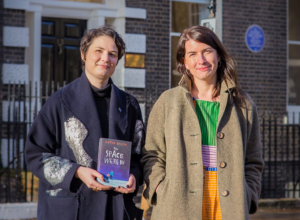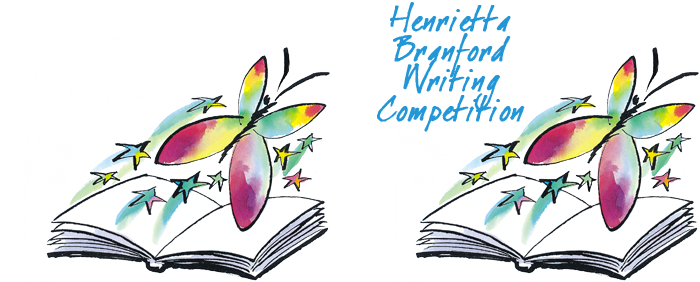Q&A with author Katya Balen
 What was the inspiration for writing The Space We’re In?
What was the inspiration for writing The Space We’re In?
I have worked with autistic people and their families for years – I started volunteering at a special needs playgroup when I was still at school, then progressed to working in SEN schools and for social care. I knew a lot of amazing families but I didn’t often see an exploration of the relationships between an autistic child and their siblings and parents in the books I read. I think it’s so important for every child to know they’re represented in fiction, and also for children to read beyond their own experience. I wanted to show autism as a different way of being, but not something that is a burden or a terrible and unfortunate condition. Max has his challenges, but he leads a rich life full of love and joy.
As a debut author, what did you find most challenging about writing the book?
I think coming up with the first draft. Usually when you’re writing your first book, you’re doing it without the support of an agent or an editor – you have to submit it and then hope they like what you’ve written. That means you’re constantly questioning whether it’s good enough, or whether the choices you’ve made in the story are the right ones. I was very shy about sharing my work with friends or family, so for a long time it was just me and my laptop. I wasn’t very clued up about the mechanics of creative writing and so giving the book the right elements was hard. I was absolutely thrilled to get edits from Lucy!
What was the thing you most enjoyed about working with Lucy on the book? Why?
Lucy is an incredible editor. She seems to know what I’m trying to do or say before I really know myself, and she’s brilliant at picking out fine details and using them to help me draw out a specific point or idea. I loved getting her notes and suddenly being able to see the book in a whole new light – things would fall into place and everything would make so much more sense. I also loved that everything was a discussion about what would work best, with options and ideas kicked about until something clicked. I have faith that Lucy can fix absolutely anything in my first drafts!
What was the best bit of advice she gave you?
It’s really hard to distil it down into one ‘best’ bit! I think Lucy has taught me so much – how to structure a book, how to link my character’s voice to how they perceive events unfolding, to think more deeply about why a character is behaving in a particular way. I suppose that telling me to challenge myself encompasses all of that! She’s made me a much better writer.
What advice would you give to debut authors?
Trust your editor, and yourself. And don’t be too hard on yourself.
Q&A with editor Lucy Mackay-Sim
What most excited you about Katya’s manuscript when you first read it?
What really thrilled me – and has thrilled me about everything Katya has written since – is the way that Katya’s characters show us their emotions through their actions, rather than their words, in ways that never feel clichéd, but nonetheless feel completely familiar and right. It’s so true to the way kids express emotion when they don’t have the words to name the complicated things they’re feeling. It’s an incredible feat of empathy and of writing skill to distil that and write it in a way that’s both pared back and instantly relatable.
What would you say was the main challenge you gave Katya as her editor?
I think I’ve challenged Katya to have faith in her own writing abilities. She’s by far her own most ruthless critic but I hope I’ve encouraged her to let that internal voice back off a bit in the knowledge that she does have the determination and talent to keep writing brilliant books. I think if you’re a little less hard on yourself you can take more risks and get outside your comfort zone, which opens up all sorts of interesting possibilities and makes you an even better writer.
What would you say are the qualities of Katya’s writing that mark her out as a talent to watch?
Since The Space We’re In, Katya has written her second book, October, October (publishing Sept, 2020) and is now working on her third, and with each book she astonishes me more with her empathy, dedication and writing skill. All three books are completely different – about very different children facing very different challenges – yet all of them are completely relatable and make you gasp at the insight and truth of them. Katya unfailingly chooses subjects for her books that feel relevant and current, yet speak to all of us, and she writes about them with more and more assurance. And she’s always on deadline! I can’t wait to see what she does next.
What do you think is the most effective scene in The Space We’re In and why?
There are so many chill-inducing scenes! One that stands out for me is after Frank has had a huge tantrum out of boredom and frustration and sadness and he’s written codes and bad words all over the kitchen wall. He’s in bed, a ball of tension and rage, waiting for fate to catch up with him, but instead of being angry, his mum comes in and just holds him until his fury drains away and he relaxes into her. It encapsulates so much that’s important to the book, especially about how we can connect to each other without words.
What is the best thing about being an editor?
I’ve heard the editing process described as a kind of dance between the author and editor and that’s a really good way of summing up what I love about it. You try to understand and anticipate the ‘moves’ – what an author is trying to create – and inhabit their mind-set so you can feel your way forward and support or guide the story in a way that feels right if there’s a stumble. There’s a lot of give and take and it’s so rewarding when an idea just clicks for both editor and author!
The Space We’re In is published by Bloomsbury Children’s Books, 978-1526601940, £10.99 hbk.


